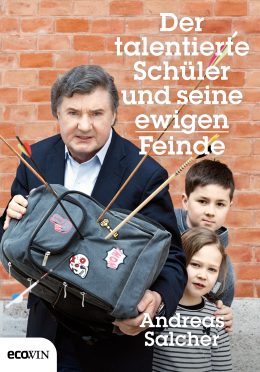
The Talented Student and His Eternal Enemies
The enemies of the talented student are all those who are willing to accept the extremely low standards of our schools and block any reform. They destroy the talents of our children and throw many of them into life without a chance.
This book is completely new, although it was first published more than ten years ago. Andreas Salcher revised it completely. The book reveals the eternal enemies of the talented student. And it shows how you still don’t have to let the joy of learning be ruined.
With expert knowledge and a sense of humor, Andreas Salcher explains how we could turn schools into places where our children enjoy learning every day. There is a way from wasted to rescued talent. Anyone can become a friend of the talented student.
Leseproben

„The Talented Kid and His Enemies“ has triggered a broad public discussion about our school system since its first appearance in March 2008. It did so because it hit the nerve of the time with a single question: How do we handle the talents of our children at school? Statements such as “We must strengthen the strengths of our children instead of digging into their weaknesses” are common knowledge today.
For the book, I interviewed some of the brightest minds in the world, such as Harvard professor Howard Gardner, happiness researcher Mihály Csíkszentmihályi, MIT learning researcher (Massachusetts Institute of Technology) Peter Senge, long-time editor-in-chief of the Harvard Business Review Alan Webber, and my spiritual mentor, Benedictine monk David Steindl-Rast. In addition, there were Nobel Prize winners, such as the unfortunately deceased Günter Blobel, who honored me by writing the original foreword. I was voted both “Writer of the Year” and “Communicator of the Year” for the “Talented Student”. So far, so good.
Unfortunately, the book has not been able to achieve one thing at all until now: that those pedagogical principles, which are clearly researched scientifically and implemented daily in some outstanding schools, find their way into the teaching practice of our school system. All students would have a right to an object “communication and social competence”, a personal coach, to self-determined learning in learning offices, to individual learning goals in addition to a school report, to interdisciplinary case studies in real life and above all to excellent teachers working in teams. The vibrant school could be a place where children enjoy learning to understand their world a little better every day.
A book can’t change a school system. It can, however, encourage parents, students, teachers and directors in their struggle against a mediocre school system. After six editions, “The Talented Student” has not been available in hardcover or paperback form for two years. Unfortunately, its mission has not yet been completed. Therefore I decided to revise the book completely.

The ideal of the German and Austrian school systems is the education of the mediocre decathlete, who performs as respectably as possible in all required disciplines. The talented long-distance runner is constantly shown his failure in shot put, the talented hurdler his weakness in pole vaulting. There is a fatal concentration on the failure and the documentation of the failure. For the student, learning means learning 80 percent of what he is not interested in or is even afraid of. We inoculate our children at an early age with the fear of doing something wrong. The consequence is that we educate children away from their creative potentials. The cold mechanism by which one-sided talents are fought at school often creates lifelong suffering. The equal treatment of unequal students is therefore the greatest discrimination.
You can buy "The Talented Student and His Eternal Enemies" at your local bookseller or you can order it at Amazon.
